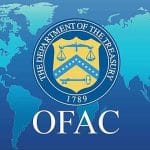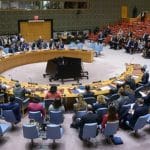In a wide series of actions on September 4, the Biden administration froze Kremlin-run websites and charged two Russian state media employees in its most sweeping effort yet to counter what it describes as Russian attempts to spread disinformation ahead of the November U.S. presidential election.
The measures, which in addition to indictments also included Treasury Department sanctions and visa restrictions barring some Russians entry into the U.S., represented a substantial U.S. Government effort before the November election to disrupt a persistent Russian threat that American officials have long warned has the potential to utilize the power of social media to generate discord and create confusion among voters.
U.S. intelligence officials have said that Moscow prefers Republican Donald Trump to win the 2024 election campaign, and noted on the record Russia remains the primary threat to elections with its focus on actively targeting the foundations of American democracy while also undermining U.S. support for Ukraine. The FBI also continues to probe a hack by Iran this year that apparently targeted the presidential campaigns of both political parties.
The most visible U.S. action announced by the Justice Department was the indictment of two employees of RT, a Russian outlet formerly known as Russia Today, which funneled $10 million to an American media company. That firm then paid several popular right-wing influencers for their content — in one case as much as $400,000 a month. Two of those influencers claimed they had no idea Russia was supporting their work.
The nearly 2,000 videos posted by the company have gotten more than 16 million views on YouTube alone, U.S. prosecutors said.
The evidence provided by the Justice Department cited original research from the Atlantic Council’s Digital Forensic Research Lab (DFRLab) on Russia’s shadow network and other covert efforts to deceive the American public.
While some of Russia’s efforts achieved the impressive social media statistics cited above and millions of views, there is little evidence to suggest Russia succeeded in directly changing many hearts or minds.
U.S. State Department takes new measures
On September 4, 2024, the U.S. State Department announced a broad series of anti-Russian measures, many seemingly small and technical/administrative when viewed separately, but important when assembled into this larger package, to counter Russia’s attempts at election interference:
“U.S. Department of State Takes Actions to Counter Russian Influence and Interference in U.S. Elections
Today, the U.S. Department of State is taking three actions to hinder malicious actors from using Kremlin-supported media as a cover to conduct covert influence activities that target the U.S. elections in 2024 and undermine our democratic institutions.
As part of a coordinated effort with the Department of the Treasury and other government agencies, the Department is introducing a new visa restriction policy, making Foreign Missions Act determinations, and announcing a $10 million Rewards for Justice offer.
The Department is announcing a new policy to restrict visa issuance to certain individuals who, acting on behalf of Kremlin-supported media organizations, use those organizations as cover for covert activities, and are responsible for, or complicit in, engaging in covert influence. We are taking these actions against these individuals exclusively for their nefarious, covert influence activities, and not for the content of any reporting or disinformation activities. As visa records are confidential, individual applications of the new policy, including names of the targets and specific identifying information, will not be disclosed publicly.
Pursuant to State Department authorities under the Foreign Missions Act, we have designated the operational U.S. presence of Rossiya Segodnya, and subsidiaries RIA Novosti, RT, TV-Novosti, Ruptly, and Sputnik, as foreign missions. These entities have an operational presence in the United States and are effectively controlled by the government of the Russian Federation.
As Foreign Missions Act-designated entities, Rossiya Segodnya, RIA Novosti, RT, TV-Novosti, Ruptly, and Sputnik will be required to notify the Department of all personnel working in the United States. The entities will also be required to disclose all real property they hold within the United States.
Finally, the Rewards for Justice (RFJ) program, administered by the Department’s Diplomatic Security Service, is seeking information on potential foreign efforts to influence or interfere in U.S. elections, including by organizations such as RaHDit, also known as Russian Angry Hackers Did It. RaHDit has previously engaged in election influence in other countries and is a threat to the 2024 U.S. elections, particularly through cyber-enabled influence operations.
Individuals who provide certain information on RaHDit could be eligible for a reward of up to $10 million or relocation under RFJ’s standing reward offer for information on foreign interference in U.S. elections.
Members of RaHDit disseminate and amplify propaganda and disinformation from the Kremlin-funded and -directed organization RT and RaHDit is associated with Russian intelligence services. RaHDit is led by Russian Federal Security Service (FSB) officer Aleksey Garashchenko.
The Department of the Treasury designated 10 individuals and two entities, pursuant to E.O. 14024 for being owned or controlled, or having acted or purported to act for or on behalf of, directly or indirectly, the Government of the Russian Federation. Also today, the Federal Bureau of Investigation announced a civil forfeiture search and seizure warrant to seize Social Design Agency (SDA) for its activities on behalf of the Russian government.”








